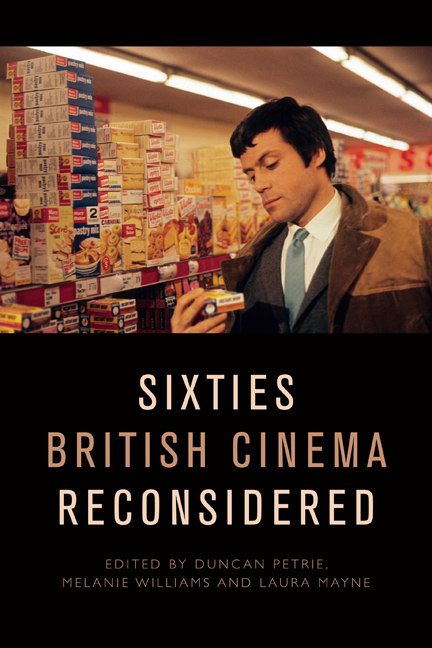Book contents
- Frontmatter
- Contents
- List of Figures and Tables
- Notes on the Contributors
- Introduction
- PART ONE STARS AND STARDOM
- 1 Male Stardom in 1960s British Cinema
- 2 ‘Rebel Rebel’?: Oliver Reed in the 1960s
- 3 Carol White: The Bardot of Battersea
- 4 ‘The Old Wave at Work’: The Transatlantic Stardom of the British Character Actress in the 1960s
- PART TWO CREATIVE COLLABORATIONS
- 5 Woodery-pokery: Charles Wood’s Sixties Screenwriting
- 6 ‘Beyond Naturalism’: Jocelyn Herbert, If . . . (1968) and Design for Performance in 1960s British Cinema
- 7 Kes: From Page to Screen
- 8 ‘I’d like to remember you as you are – as just a grumpy old man’: Joseph Losey and the Making of Figures in a Landscape (1970)
- PART THREE STYLE AND GENRE
- 9 ‘Wholesome rough stuff’: Hammer Films and the ‘A’ and ‘U’ Certificate, 1959–65
- 10 Widescreen Pyrotechnics: Shot Composition and Staging in the Cold War Films of Joseph Losey and Sidney J. Furie
- 11 The Rise and Fall of the Colourful Corporate Fantasy in 1960s British Cinema
- 12 Witchfinders and Sorcerers: Sorcery and Counterculture in the Work of Michael Reeves
- PART FOUR CULTURAL TRANSFORMATIONS
- 13 ‘An Impulse of Anger, Instantly Regretted’: Rebellion and Reaction in the Early-1960s Naval Film
- 14 Narratives of Race and Identity in Sixties British Cinema
- 15 Panic at the Disco: Brainwashing, Alienation and the Discotheque in Swinging London Films
- Index
Introduction
Published online by Cambridge University Press: 22 September 2020
- Frontmatter
- Contents
- List of Figures and Tables
- Notes on the Contributors
- Introduction
- PART ONE STARS AND STARDOM
- 1 Male Stardom in 1960s British Cinema
- 2 ‘Rebel Rebel’?: Oliver Reed in the 1960s
- 3 Carol White: The Bardot of Battersea
- 4 ‘The Old Wave at Work’: The Transatlantic Stardom of the British Character Actress in the 1960s
- PART TWO CREATIVE COLLABORATIONS
- 5 Woodery-pokery: Charles Wood’s Sixties Screenwriting
- 6 ‘Beyond Naturalism’: Jocelyn Herbert, If . . . (1968) and Design for Performance in 1960s British Cinema
- 7 Kes: From Page to Screen
- 8 ‘I’d like to remember you as you are – as just a grumpy old man’: Joseph Losey and the Making of Figures in a Landscape (1970)
- PART THREE STYLE AND GENRE
- 9 ‘Wholesome rough stuff’: Hammer Films and the ‘A’ and ‘U’ Certificate, 1959–65
- 10 Widescreen Pyrotechnics: Shot Composition and Staging in the Cold War Films of Joseph Losey and Sidney J. Furie
- 11 The Rise and Fall of the Colourful Corporate Fantasy in 1960s British Cinema
- 12 Witchfinders and Sorcerers: Sorcery and Counterculture in the Work of Michael Reeves
- PART FOUR CULTURAL TRANSFORMATIONS
- 13 ‘An Impulse of Anger, Instantly Regretted’: Rebellion and Reaction in the Early-1960s Naval Film
- 14 Narratives of Race and Identity in Sixties British Cinema
- 15 Panic at the Disco: Brainwashing, Alienation and the Discotheque in Swinging London Films
- Index
Summary
REVISITING AND RECONSIDERING A ‘FAMILIAR’ DECADE
From James Bond to the Beatles, madcap comedy to unsettling horror, social realism to psychedelia, the 1960s witnessed a major resurgence in the creative vitality and international appeal of British cinema. An influx of Hollywood finance gave British films unprecedented access to global markets, boosting their visibility and earning power; the United Artists-backed James Bond series, initiated by Dr No (1962), provided the most conspicuous example of this new box office phenomenon. British films attained new levels of international critical acclaim, winning the Oscar for Best Film on no less than four occasions during the decade: Lawrence of Arabia (1962), Tom Jones (1963), A Man for All Seasons (1966) and Oliver! (1968). Top prizes at the Berlin Film Festival went to A Kind of Loving (1962), Repulsion (1965) and Cul-de-Sac (1966). British productions also triumphed at Cannes, with three Palme d’Or wins during the 1960s for The Knack … and how to get it (1965), Blow Up (1966) and If … (1968), and Accident (1967) sharing the Grand Prix Award, while the previous year Alfie (1966) had picked up the Prix du Jury. These productions, running the generic gamut from historical drama to big-budget musical to art film, from the grim north to swinging London, suggest something of the diversity of Britain's film output during the decade. Although the impact of these films was immediate, their longer-term legacy was also significant. Thirty years later, one of the few scholarly overviews of the period's film culture, Robert Murphy's Sixties British Cinema, came to the conclusion that ‘the 1960s saw a greater number of significant and exciting films made in Britain than at any time before or since’.
Yet despite that level of success and acclaim (or perhaps because of it), there has been surprisingly little academic engagement with 1960s British cinema in its entirety, Murphy aside. Instead, the 1950s and 1970s, both more contentious decades in terms of their achievements and significance, have been the subject of numerous monographs and edited collections.
- Type
- Chapter
- Information
- Sixties British Cinema Reconsidered , pp. 1 - 8Publisher: Edinburgh University PressPrint publication year: 2020



